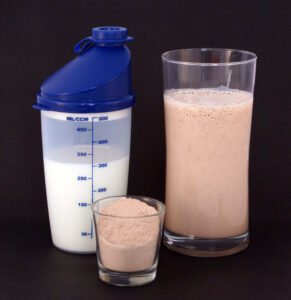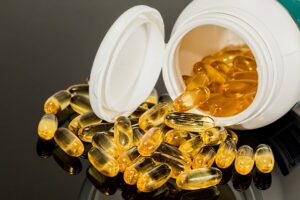These days there is an entire industry dedicated to nutritional supplements. If you wander into one of the health food stores in Horsham there are tablets, capsules, liquids and powders, all designed to boost the nutritional content of your diet. The sheer volume of products all offering completely different results can be completely overwhelming!
You could be standing there wondering if you should take just one or combine a variety of them. You’ve probably read that protein is important in your diet – do you need a supplement? How do you know if these products deliver what they promise? So many questions and too many answers.
Everyone is different, both with their fitness levels, their diet and health and their goals. You might be working on hardcore strength building or just want to keep your body healthy. The supplements you need are very much dependent on your own individual goals. At Bluecoats we believe that you can get all you need from a well-balanced diet but understand that there are for many there are restrictions which may hamper the ability to achieve this alongside your fitness regime. For those that are interested here is our easy to understand guide of which nutritional supplement you could consider, depending on what level you are working at:
Strength Building and Body Building
If you’re a serious strength or physique athlete, you’ve probably heard that supplements can help you really maximise your training sessions. But which ones?
If your goal is to get as strong as possible, here are a few products that will help you do it.
-
Creatine Monohydrate
Creatine supplements help to maintain energy during high-intensity exercise such as weightlifting by producing more creatine in the muscle.
-
Whey Protein
Fast-digesting protein like whey is optimal post-workout as it can help improve your muscles’ ability to recover and adapt after strenuous exercise. You can get your protein fix after your workout at our Gallery Café, who offer a range of delicious protein shakes.
-
Branched Chain Amino Acids
Amino Acids, especially leucine, help to regulate protein metabolism by promoting reduced protein and muscle breakdown during intense exercise. This in turn may improve recovery of muscles damaged during resistance training.

Health and Wellbeing
If you are just interested in keeping fit and healthy and enjoy regular exercise classes, you should be using the more ‘everyday’ supplements for a healthy mind and body.
-
Omega 3
Omega 3 is a polyunsaturated fatty acid and ‘essential’ meaning that it cannot be synthesised in the body. So, this has to come from our diet, which means it is key to keep it topped up. Where possible it is important to aim to get Omega 3 fatty acids from food such as oily fish rather than supplements, but good supplements are walnuts, soybean oil, flaxseed & flaxseed oil. Fatty acids are the building blocks our body uses to make hormones but also plays a role in energy production, healthy cholesterol, the immune system, regulating inflammation, mood and more.
-
Daily Vitamins
Daily Vitamins are a great way to help you reach your recommended daily allowance of essential vitamins your body requires to perform and function to its potential. There are 7 essential daily vitamins which include B vitamins, vitamin C, E, A and D3. The B vitamins are particularly important for people who exercise:
Vitamin B2 contributes to normal energy-yielding metabolism, normal functioning of the nervous system, maintenance of normal red blood cells, contributes to the reduction of tiredness and fatigue and to the protection of cells from oxidative stress.
Vitamin B1 contributes to normal energy-yielding metabolism, normal functioning of the nervous system, normal psychological function and normal function of the heart.
-
Green Tea Extract
Green Tea originates in China and is made solely from leaves of the Camellia Sinesis that have undergone minimal oxidation during processing. Unlike other tea, many of the bioactive compounds in the tealeaves actually make it into the final drink, which contains large amounts of antioxidants. Green tea extract is also believed to increase the activity of norepinephrine, a hormone that helps you burn fat.

Post Pregnancy
-
Continue to take Folic Acid
Folic Acid also plays an important part in the health of your blood along with your heart health. The Department of Health recommends women should take a daily supplement of 400 micrograms whilst they are trying to conceive and continue during the first 12 weeks of pregnancy.
-
Protein
Giving birth is hard on your body and afterwards you need time, rest, and plenty of calories to recover fully. If you’re breastfeeding, you have a significantly higher demand being placed on your body from milk production. The daily allowance of protein for pregnant and nursing women is nearly 50% above the recommended level for non-nursing women. If you’re looking to start training regularly or add muscle, those needs actually increase so you can adequately support exercise recovery and muscle growth. You can get this extra protein through a natural protein powder though before adding any supplement into your diet it is important to take medical advice from your doctor.
-
Vitamin D, iron, and calcium
These are common deficiencies in new mums and can easily be replaced by supplements to ensure optimum health so you’ve plenty of energy to look after your new baby!
All of these nutritional supplements, with a well-rounded diet and management plan including regular exercise and a balanced diet can help you to achieve your goal.
Remember; if you would like to talk to someone about your specific situation then please do not hesitate to ask a member of our fitness team and at the very least we can point you in the right direction.
You may also like to check out our other blogs Vegan Diet, The Effects of Alcohol on your Fitness Regime and Food v’s Exercise for more of an insight.